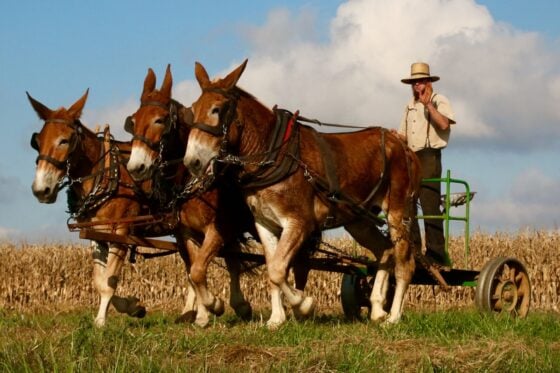How do Amish make money?
Today’s Amish make a living in a variety of occupations besides dairy farming
 For much of their history, Amish have farmed. However, in recent years, Amish have faced elevated land prices in many of their communities. Since the Amish population is rapidly growing, many Amish have found it increasingly difficult to remain in dairy farming.
For much of their history, Amish have farmed. However, in recent years, Amish have faced elevated land prices in many of their communities. Since the Amish population is rapidly growing, many Amish have found it increasingly difficult to remain in dairy farming.
Amish have therefore moved into different occupations in order to earn money to support their families.
Amish occupations include:
- Produce farming-produce farming requires less land than the traditional dairy
- At-home shops-Amish have thrived in the furniture and manufacturing industries. Read more on Amish furniture.
- Mobile or remote businesses-many Amish operate construction crews or market stands in non-Amish areas. Amish carpenters, Amish roofers, Amish masons are common Amish businesses in the building industry.
- Factory and non-farm work-in some communities, work in non-Amish factories has become the primary occupation
- Sideline businesses-many Amish operate part-time businesses, from quiltmaking to roadside stands in order to supplement income
- Other Amish occupations-Amish may work in a variety of less-common occupations, such as accounting or taxidermy
Produce farming

Produce farms can be operated on as little as a few acres, as compared to the 60-80 that dairies typically require. Produce farming is labor-intensive rather than mechanized, which suits the Amish well.
Some Amish may specialize in organic produce. Amish sell their produce at produce auctions, through co-ops and Community Supported Agriculture (CSA) programs, and at roadside stands.
At-home shops
Amish operate a variety of at-home businesses. The most common are shops which produce wood products such as furniture or cabinets. Sawmills and pallet shops are lower-tech businesses especially favored by Amish with a more restrictive Ordnung. Amish also operate bulk foods and dry goods stores, buggy and harness shops, engine repair shops, and manufacturing operations. Some Amish businesses cater to the tourist industry.
Certain Amish companies, in particular some larger furniture makers, generate a large income for their owners. Amish women may operate businesses as well, for example quilting, baking, and craft enterprises. Money earned by Amish women may supplement a family’s income, or in rare cases may even be the primary source of earnings.
Mobile and remote Amish businesses

Many Amish operate carpentry crews that do work on homes in distant locations, sometimes even two hours away. Amish may do general contracting work, or subcontracting.
Some Amish specialize in masonry or roofing work, or may do landscaping or build decks. Amish do both commercial and residential building, and do remodeling work as well.
Market stands are another popular Amish business, seen especially among Amish from Lancaster County. Pennsylvania Dutch or “Amish” markets may be located in or near highly populated areas such as Philadelphia or Baltimore. Amish market stands typically sell foods such as baked goods, meats and cheeses, crafts, and furniture.
Factory and non-farm work
In some Amish settlements, such as Geauga County, Ohio, and Elkhart and Lagrange Counties in Indiana, a large number of Amish make a living by working in factories. Many RV factories are located in northern Indiana, for example, and work in factories is the most common occupation among Amish men in this settlement. Amish factory workers can make a substantial income, though work away from home in non-Amish settings is seen as less than ideal by some Amish.
Part-time “sideline” businesses

Amish may operate part-time or “sideline” businesses in addition to a main job in order to make extra money. Men may produce furniture in a small shop, or women may make quilts or operate a roadside stand at home.
Amish are quite entrepreneurial, and farmers themselves often have sideline businesses. A part-time business may grow until it becomes an Amish person’s main occupation.
Other Amish occupations
A few Amish may work in less-common occupations. Often these are specialized trades that may serve the needs of a local community. Most larger Amish settlements have at least one Amish accountant, for example.
Some Amish provide auctioneer services for the numerous auctions and sales that take place in their communities. Other Amish offer taxidermy services to hunters. Occasionally Amish even offer health services, such as podiatric treatments, though this can be controversial.
Amish earn money in a variety of ways
Amish have always been an adaptable people, and with the lack of affordable farmland, they have had to adjust in order to survive. Amish make money today in a variety of occupations, from at-home shops to small intensively-farmed produce operations to mobile work crews working in upscale developments.
For further information, see:
Amish Enterprise: From Plows to Profits, Donald B. Kraybill and Steven M. Nolt






Amish and Mining
Hi All,
Just curious, do Amish mine? I mean, I have never heard of an Amish miner? Is there a religious reason why Amish might not be allowed to work underground?
Thanks,
Quantella Owens
Amish underground
Quantella, I’m not aware of any Amish miners today, though Amish in Holmes County Ohio apparently once worked in the area’s strip mines. Holmes locals can fill in details better than I, but those are mostly if not all a thing of the past. Not quite the same as an underground mine, but for what it’s worth. There are no religious reasons stopping Amish from working underground.
bakers needed for farmers market
I am looking for any Amish to sell their bakery at our new farmers market in Jefferson wi. Do have any info as to who I may contact. Thank you
We are amish from middlefield ohio and have connections to other amish from Indiana to new york. If you wanna call us at 330-212-0551 we can schedule something with amish in your area to see if.they would be willing to have bake goods sold. 🙂 330-212-0551
Amish worker
Hi Erik,
Can you tell me how can I hire Amish workers and do you know if there are any Amish who do construction near johnstown pa
Custom crafters/woodworking for hire?
Will Amish craftsmen do custom jobs for hire? How would I find a woodworker to make an jewelry holder like a picture I have? If possible, I would like to find one in the Viroqua/Westby area. Thanks for any input.
Barb
Barb many Amish craftsmen do custom jobs. Here is a list of Wisconsin furniture shops. https://amishamerica.com/amish-furniture-wisconsin/
Most are non-Amish retailers, who might be able to arrange a custom job. Alternatively you can visit a community near your area and simply ask. That will take more time but probably more fun.
What are the controversies within the Amish community with working outside of the community?
Ana, briefly, it has to do with being away from the home (whether working on say a construction crew, or at an off-site market in or near a city), which cuts into family time, as well as sometimes places Amish in worldly environments.
Some Amish find these arrangements acceptable, others do not.
Amish wood product manufacturers
Looking for Amish wood product manufacurers in OH or KY
So the Amish are dependent of money, like us? Does that mean that if the modern economy around them collapses, they are in trouble? I thought that they were farming in order to collect food and eat it, not in order to sell it to get money, so they can buy food to someone else who produces food (which is what farmers do in modern societies). They may be much more modern than I thought, if they work for money, instead of working to produce the things they need.
Actually, it is in most cases both, not either-or. Though some Amish are more self-sufficient than others at least in food production, they’re generally dependent on numerous ways on the modern economy. Many if not most Amish do a good bit of canning, for example. Here is more on the question of self-sufficiency, answered by an Amish man in Pennsylvania: https://amishamerica.com/how-self-sufficient-are-the-amish/
Thank you, Erik. I learned something. Here in France we know very little about the Amish.
Here in Missouri!
The Amish operate many puppy mills – I find that shocking! Apparently dogs/puppies are considered livestock by them and their care is deplorable. I really thought more of them than that. Care to defend/explain?
Puppy mills=bad.
No, not really. Used to get into this, but it’s a lose-lose topic.
It always seems to bring out the ugliest side of people. I don’t mean your comment Dianne, but if you knew some of the nasty, vulgar comments I’ve had to delete 🙂
But…if you’re truly interested feel free to use search box on this site to find my and others’ previous comments and posts on puppy mills.
So I’ll just sign off with: if you see a bona fide puppy mill, English or Amish-owned, report it.
Carpentry
Do Amish carpenters have issue with teaching non-Amish women or women as a whole about Carpentry. I have a great interest in learning about it and the quality of woodwork done by the Amish is Beautiful.
Donation!!!!
I have two manual knitting machines that I would like to donate. I also have a circular sewing machine (electric) for sweaters to be donated. There are in very good working order!!! If somebody is interested please answer to this e-mail address. Thank you
Amish working hours
Recently, we purchased wooden playground equipment from an Amish company. When it was being installed, the workers mentioned that they would remove the old equipment and reinstall it elsewhere, if there was time before it got dark. Do they have restrictions on working after dark? Or is it just practicality ( not wanting to use electric lighting and wanting to get home while it’s not too dark)?
That was probably just about practicality Astrid. If need be, Amish people get work done when the sun’s gone down (or has yet to rise–just ask an Amish dairy farmer 🙂 ).
Amish Puppy Mills
How could you write this article and not mention the Amish Puppy Mills?
http://www.citizensagainstpuppymills.org/pmamish.php
"Puppy Mill" Omission
I feel that indirectly the questioned raised is answered broadly in this statement:
“Amish earn money in a variety of ways
Amish have always been an adaptable people, and with the lack of affordable farmland, they have had to adjust in order to survive. Amish make money today in a variety of occupations, from at-home shops to small intensively-farmed produce operations to mobile work crews working in upscale developments.”
‘Puppy Mills’ are a touchy subject at the best of times, regardless of the faith of the operators, and Erik/Amish America omitted subject, most likely because it had either been covered elsewhere or depending on the date of the entry, would be discussed later, as this is an older posting.
Yes, search the term in the search box and you’ll find a number of posts on this site on that sad topic.
I’ve noticed there are commenters who seem to roam the internet and leave puppy mill comments on articles, sometimes on ones that have nothing to do with the subject other than they include mention of the Amish (we get them on random posts on the AA Facebook page for example). This one at least is somewhat related.
Usually I ignore them because they are often little more than drive-thru spamming, and you’re probably not going to get a thoughtful discussion out of it.
But Lee if you’re still here, you can also check out our most recent post of a few weeks ago on the topic: https://amishamerica.com/colorado-amishman-plans-dog-business-locals-fear-puppy-mill/
Factory workers
I am looking for about 10 dedicated and reliable employees who wish to earn a good wage with great benefits. My plant is within an hours drive of the Carrol County TN Amish communities.
Do you have any advise on how to make contact with the folks?
Amish factory workers
Hi Jeff, the most feasible and best way is probably face-to-face. The distance may be a little far, and factory work while being common in some communities is not a regular thing in others.
But you might try approaching the Amish in that settlement and see what response you get. I’d recommend driving over and simply visiting a business, introducing yourself, striking up a friendly conversation and then explaining what you do and that you’re looking for workers and maybe asking the business owner for his advice/help as to how to spread the word (and/or simply if he thinks there might be interest in his area). I’m assuming the labor force is not unionized, which if it were, would not fit with the Amish.
It’s a small Amish population in Carroll County (there are technically 2 small settlements in the county, one partially in the county with the rest living in Weakley County) and I don’t know much about the typical occupations there.
Donation
Are these still available ?? And if so Please send me more information on how to get them. Thank You
La Plata Missouri
Erik..are there many Amish in and around La Plata Missouri?